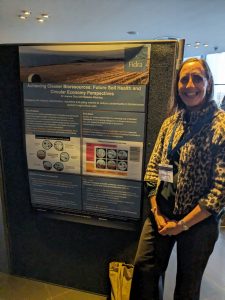Biosolids
Biosolids (treated sewage sludge) contain soil health-enhancing organic matter and essential crop nutrients, but they are most beneficial when they are free from persistent chemical contaminants and microplastics that can have detrimental impacts on the environment. In November, Fidra Senior Project Manager and soil scientist, Dr Jo Cloy, attended the 2023 European Biosolids & Bioresources conference in Manchester. This event brought together international bioresource and biowaste experts to share knowledge and discuss the latest innovations and solutions for achieving clean bioresources and protecting the environment.
Valuable nutrients in biosolids are recycled to land to reduce reliance on inorganic (chemical) fertilisers and extraction of non-renewable mineral and fossil fuel resources. However, biosolids and other biowastes often contain persistent contaminants that threaten soil health, particularly soil biodiversity which underpins critical soil processes.
How are biosolids contaminated?
The presence of contaminants in biosolids occurs due to widespread continued manufacture and use of products containing chemicals such as PFAS, pharmaceuticals, microplastics and bisphenols. They end up in household and industrial wastewaters and through use of biosolids as fertilisers, they contaminate soils and become trapped in the sewage contaminants cycle. Highly persistent chemicals, that remain poorly monitored and understood, are difficult to remove from wastewaters during treatment and it is almost impossible to remove them once they reach our soils and wider environment.
Here at Fidra we are working closely with industry, academics and policy makers to tackle emerging contaminants in bioresources that make their way into soils. Fidra understand the need to protect our precious agricultural soils from contaminants at the same time as addressing interrelated biodiversity and climate emergency challenges. Are contaminated biosolids costing us the earth? Soil health and a safe circular economy must not be overlooked.
Sharing knowledge and solutions
At the European Biosolids & Bioresources conference, water sector experts came together to discuss bioresources management and policy, circular economy, landbank and chemical contaminant challenges. There were insightful talks from world-leading experts who had come to Manchester to share the latest innovations, cutting-edge technologies and research developments in bioresources and biowaste processing.
Fidra presented their poster entitled ‘Achieving Cleaner Bioresources: Future Soil health and Circular Economy Perspectives’ and built new collaborations for strengthening Fidra’s mission to shine a light on environmental issues. The conference highlighted important progress in nutrient recovery and pyrolysis technologies, knowledge gaps and the need for increased scientific evidence to progress viable upstream and downstream solutions that will address emerging contaminants in bioresources.
Visit our sewage free soils webpage or sign up to our newsletters. Please contact the Fidra team via info@fidra.org.uk if you would like to hear more or get involved in our project.

